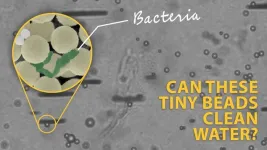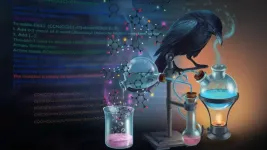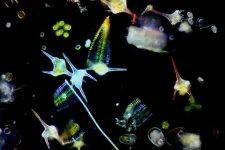(Press-News.org) Scientists at the University of Surrey are developing a new way to power low-orbit spacecraft using – literally – thin air.
Surrey Space Centre aims to enable extremely low-altitude spacecraft orbits in the upper atmosphere, thanks to funding from the UK Space Agency.
This new spacecraft concept could offer new capabilities in Earth observation, climate monitoring and satellite communications.
Dr Andrea Lucca Fabris, principal investigator from Surrey Space Centre and an electric propulsion specialist, said:
“There are benefits to flying in very low altitude orbits, like being able to operate Earth observation at much higher resolutions than offered at present.
“It could also mean faster telecommunications, and it opens the door to new scientific discoveries about conditions in the ionosphere, which could help develop more accurate atmospheric models.”
The thin air at extremely low altitude orbits means a different type of spacecraft design and propulsion is needed compared with those used by conventional spacecraft operating in the vacuum of traditional low Earth orbits.
Air-breathing electric propulsion harnesses upper atmospheric air as propellant for an electric thruster.
This allows spacecraft to maintain their orbital altitude via drag-compensation, removing the need to store propellant on board. It means mission lifetimes do not have to be limited by propellant capacity.
Dr Mansur Tisaev, who recently completed his PhD at Surrey Space Centre said:
“We’ve been developing a cathode, or neutraliser, to work in electrostatic thrusters operating in the thin air found in ultra-low Earth orbit. By collecting and compressing the gases at that altitude, we can create a propellant flow that is ionised (i.e., transformed into a mix of charged particles) and accelerated using combinations of electric and magnetic fields, harnessing electrical power from solar panels.”
The UK Space Agency have awarded the team £250k for a one year project to develop their concept. This will fund conceptual design, propulsion testing, orbital mechanics analyses and aerodynamic simulations.
The activities will be a joint effort between the propulsion (Dr Andrea Lucca Fabris), astrodynamics (Dr Nicola Baresi), spacecraft engineering (Prof Craig Underwood) groups of the Surrey Space Centre and the Surrey’s Centre for Aerodynamics and Environmental Flow (Dr Olaf Marxen).
ENDS
END
New air-breathing spacecraft to provide better Earth observation and quicker communications
2024-05-08
ELSE PRESS RELEASES FROM THIS DATE:
Exploring the asteroid apophis with small satellites
2024-05-08
The author of a disaster novel couldn't have dreamed it up any better: On a Friday, the thirteenth of all days, the potentially dangerous asteroid (99942) Apophis will come extremely close to humanity. On 13 April 2029, there will only be around 30,000 kilometres between the cosmic rock and Earth. It will then be possible to see Apophis with the naked eye as a point of light in the evening sky, even from Würzburg.
What makes the asteroid so dangerous: its average diameter is an impressive 340 metres. If it were to hit the Earth, the ...
Research warns of hazardous health risks from flavored vapes
2024-05-08
Research warns of hazardous health risks from flavoured vapes
Research predicts the potential formation of 127 acutely toxic chemicals in flavoured vapes
Findings underscore the urgent need for comprehensive regulation of vaping products
Wednesday, 8 May 2024: New research has uncovered the potentially harmful substances that are produced when e-liquids in vaping devices are heated for inhalation. The study, published in Scientific Reports, highlights the urgent need for public health policies concerning flavoured vapes.
The research team at RCSI University of Medicine and Health Sciences, Dublin, used artificial ...
FAU researchers receive $1M in FDOH grants to fight Alzheimer’s disease
2024-05-08
Three Florida Atlantic University researchers at the forefront of Alzheimer’s disease (AD) research have each received a $350,000 grant from the Florida Department of Health’s “Ed and Ethel Moore Alzheimer’s Disease Research Program.”
The Ed and Ethel Moore Alzheimer’s Disease Research Program was established to improve the health of Floridians by stimulating research into the prevention, diagnosis, treatment, care management and cure of AD.
Florida has the second highest incidence of AD in the nation with 580,000 people ages 65 and ...
Swarms of miniature robots clean up microplastics and microbes, simultaneously (video)
2024-05-08
When old food packaging, discarded children’s toys and other mismanaged plastic waste break down into microplastics, they become even harder to clean up from oceans and waterways. These tiny bits of plastic also attract bacteria, including those that cause disease. In a study in ACS Nano, researchers describe swarms of microscale robots (microrobots) that captured bits of plastic and bacteria from water. Afterward, the bots were decontaminated and reused. Watch a video of them swarming.
The size ...
Where wildlife is welcome
2024-05-08
How do city residents feel about animals in their immediate surroundings? A recent study by the Technical University of Munich (TUM), the University of Jena and the Vienna University of Technology shows how different the acceptance of various wild animals in urban areas is. Important factors are the places where the animals are found and their level of popularity - squirrels and ladybugs come out on top here. The results have important implications for urban planning and nature conservation.
The relationship between city inhabitants and urban animals is complex, ...
THC lingers in breastmilk with no clear peak point
2024-05-08
PULLMAN, Wash. – When breastfeeding mothers in a recent study used cannabis, its psychoactive component THC showed up in the milk they produced. The Washington State University-led research also found that, unlike alcohol, when THC was detected in milk there was no consistent time when its concentration peaked and started to decline.
Importantly, the researchers discovered that the amount of THC they detected in milk was low – they estimated that infants received an average of 0.07 mg of THC per day. For comparison, a common low-dose edible contains 2 mg of THC. The research team stressed that it is unknown whether this amount has any impact ...
An AI leap into chemical synthesis
2024-05-08
Chemistry, with its intricate processes and vast potential for innovation, has always been a challenge for automation. Traditional computational tools, despite their advanced capabilities, often remain underutilized due to their complexity and the specialized knowledge required to operate them.
Now, researchers with the group of Philippe Schwaller at EPFL, have developed ChemCrow, an AI that integrates 18 expertly designed tools, enabling it to navigate and perform tasks within chemical research with unprecedented efficiency. “You might wonder why a crow?” asks Schwaller. “Because ...
U of T researchers lead discovery of natural compounds that selectively kill parasites
2024-05-08
An international team led by researchers at the University of Toronto has found a family of natural compounds with potential as new and more effective treatments for parasitic worms. The compounds stall the unique metabolic process that worms use to survive in the human gut.
Parasitic worms transmitted through soil wreak havoc in developing countries in the tropics. Infection by these parasites leads to malaise, weakness, malnutrition and other debilitating symptoms, and can cause developmental defects in children and impair their growth.
“Soil-transmitted parasitic worms infect over one billion people around the world, typically in low-income communities of developing countries ...
Limited adaptability makes freshwater bacteria vulnerable to climate change
2024-05-08
Freshwater resources are limited, accounting for only 3.5% of Earth’s water, with just 0.25% accessible on the surface. Nevertheless, freshwater lakes are essential for ecosystem functioning and global carbon cycling due to their high biological productivity and microbial activity. They are critical to human survival, providing drinking water, supporting agriculture, fisheries, and recreation. However, climate change – particularly rising temperatures – threatens these habitats by disrupting microbial communities that are essential for nutrient cycling and water quality maintenance.
Challenging established evolutionary paradigms
“Considering ...
Gene linked to learning difficulties has direct impact on learning and memory
2024-05-08
A gene previously linked to intellectual disability has been found to regulate learning and memory in mice.
The gene, called KDM5B has previously been linked to some intellectual disability disorders and autism. In the general population, some variants are also associated with reduced brain function, although not sufficient to cause an overt disability or behavioural symptoms.
Now, researchers at King’s College London, the University of Exeter and the University of California Irvine have found that reduced function of the gene in the brain results in loss of learning ability and memory and a reduction in the brain’s ability to strengthen connections between neurons, ...





